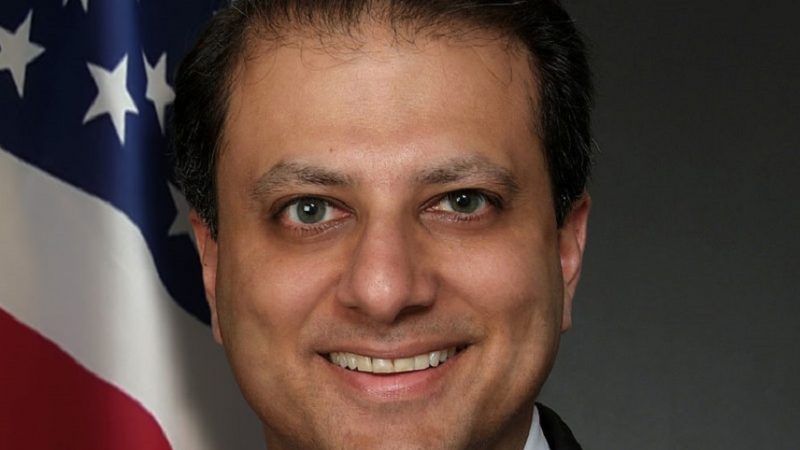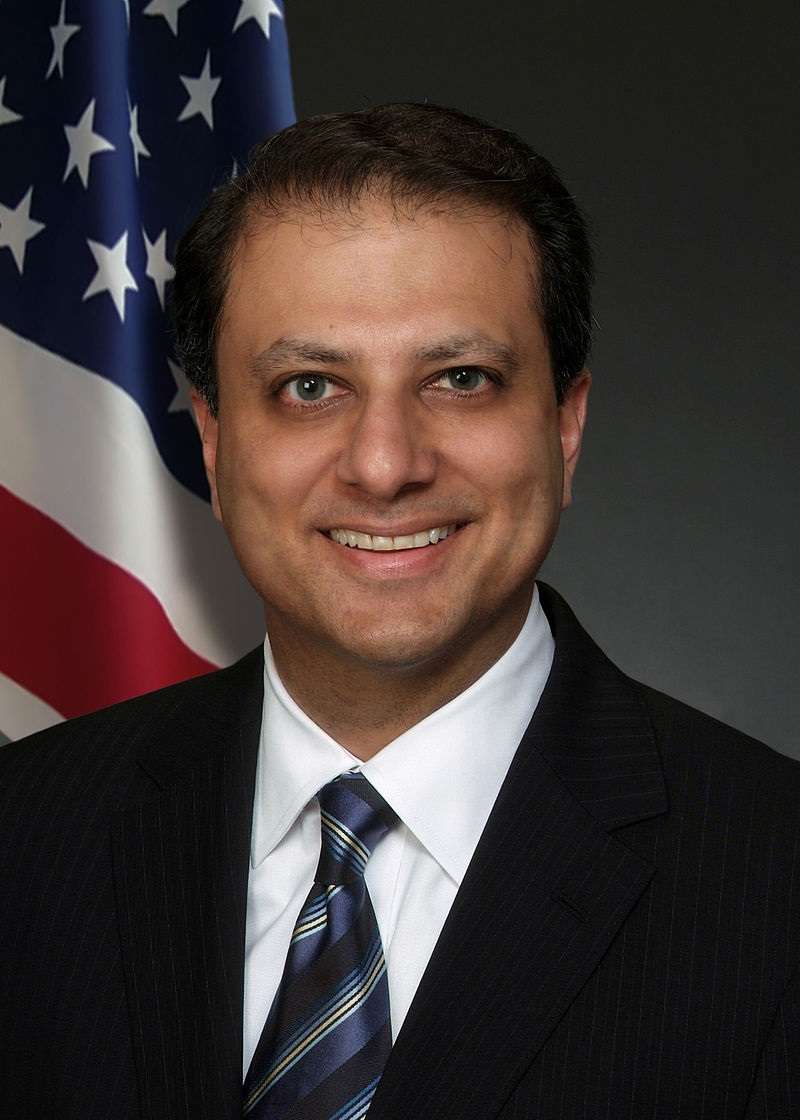Preet Bharara's Boy Scout Manual of 'Doing Justice'
The former U.S. attorney for the Southern District of New York unconvincingly channels Atticus Finch in his legal memoir.


From the very first pages of his new legal memoir, former U.S. Attorney for the Southern District of New York (SDNY) Preet Bharara underscores his commitment to all that he believes is good, decent, and disappearing fast in contemporary America. Reason readers may remember him as the official who, in 2015, issued a grand jury subpoena demanding Reason.com turn over "any and all identifying information" of six commenters who had criticized District Court Judge Katherine Forrest's sentencing of Silk Road founder Ross Ulbricht. Shortly after we received the subpoena, his office issued a gag order on Reason, which prevented us from discussing the demand for records until it was lifted (more on that in a bit).
In Doing Justice, Bharara sounds like an Aaron Sorkin protagonist; a mix of Tom Cruise's character from A Few Good Men and Atticus Finch in To Kill a Mockingbird (a version of which Sorkin is currently directing on Broadway).
Phrases and concepts like "the rule of law" and "due process" and "presumed innocent" seem to do service these days more as political slogans than as bedrock principles….It seems preferred these days to demonize one's opponents rather than engage them, to bludgeon critics rather than win them over. There is a creeping contempt for truth and expertise….And the concept of justice seems turned on its head—holding different meaning depending on whether you are a political adversary or ally.
The law, he continues, "is not a political weapon; objective truths do exist; fair process is essential in a civilized society." Especially in a world that seems hell-bent on burning down existing norms and institutions—one in which the president attacks a dead rival and Democratic contenders for president lobby for the destruction of the Electoral College—that all sounds comforting, as does Bharara's insistence that it's "an undeniable fact" that "the system is imperfect."
Over more than 300 pages broken into four large sections ("Inquiry," "Accusation," "Judgment," and "Punishment"), he tells a wide variety of stories from his time at SDNY about how the feds decide who to charge with what sorts of crimes. There are some famous cases here, such as the prosecution of Faisal Shahzad, who in 2010 tried to detonate a car bomb in Times Square; the "cannibal cop," an NYPD officer whose conviction on conspiracy to kidnap women he fantasized about torturing and eating was overturned; and the successful cases against Sheldon Silver, speaker of the New York State Assembly, and Dean Skelos, the majority leader of the New York State Senate, on federal corruption charges.
Among the most appealing tales involves Brandon Mayfield, an American whom the FBI, on the basis of a fingerprint match, mistakenly insisted was involved in the March 2004 terrorist attacks on trains in Madrid, Spain. In a chapter called "The Problem of Confirmation Bias," Bharara notes that the paucity of physical evidence (a single fingerprint match from a plastic bag used by the bombers) was complemented by a series of seemingly incriminating coincidences. Mayfield, a lawyer, had represented a convicted terrorist in a trial. His wife was a Muslim immigrant from Egypt and he had converted to Islam. He attended a mosque in Beaverton, Oregon that had, in Bharara's artful phrasing, "received attention from local authorities." "The science had spoken," he writes. "The [fingerprint] match had been made and confirmed….Clearly the FBI had got its man." Except they hadn't. Even as the feds took Mayfield into custody, Spanish investigators "definitively concluded" that the fingerprint was a match with an Algerian suspect named Ouhnane Daoud. The FBI officially apologized (a rare thing) and the government eventually paid Mayfield $2 million. Bharara notes that the FBI's internal investigation concluded that agents running the investigation became so uncritically accepting of their theory that they created a "failure to sufficiently reconsider" their suppositions even after they found no real corroborating evidence. "That is worth repeating," says Bharara. "An innocent man was accused and forever injured because of a failure to sufficiently reconsider" (his emphasis). A cautionary tale, to be sure.
Yet Bharara's treatment of the Reason episode reveals a fair amount of distance between his ideals and his actions while in office and suggests the blindness with which prosecutors tend to act. He writes that law enforcement people have a "God forbid" voice in their head warning them that the consequences would be catastrophic if they ignored what turned out to be legitimate threats against public officials from the president on down. "When the possibility of harm is afoot," he writes, "prosecutors are aggressive."
During the Silk Road trial, Judge Katherine Forrest had become "the victim of abuse and harassment," says Bharara, including having her Social Security number and home address made public. In a bit of rhetorical slipperiness, he writes that "her critics called for SWAT teams or anthrax to be sent to her residence," though such things never happened (my emphasis). When it comes to Reason's commenters, he says that a "string of threats was made," including lines such as "it's judges like these that should be taken out back and shot" and "send her through the wood chipper" (this last is a reference to a scene in the movie Fargo, in which criminal characters violently dispatch one of their own ilk).
Prosecutors in my office took aggressive action. They subpoenaed the records of six Reason users who posted threatening statements. They sought a boilerplate gag order…so that Reason could not prematurely and publicly discuss the subpoena before law enforcement could run down the leads, to determine whether there was any actual threat.
"Pretty routine and responsible," he concludes, surprised that "for this, I earned the endless antipathy of the libertarian periodical."
Well, principled opposition and criticism of government action isn't "endless antipathy" and there are in fact good reasons to be concerned by Bharara's version of events, which blurs some details and simply ignores the massive, nearly unconstrained power the government wields in such situations. His office filed the subpoena but forgot to attach a gag order, so we shared the subpoena with the six commenters to see if any were planning to quash it, which would affect our compliance with the demand. The gag order came a couple of days later, after our attorney had talked with an assistant U.S. attorney and explained that we had shared the subpoena with the targeted commenters (once the gag was in place, we complied fully with it).
As former assistant United States attorney and law blogger Ken White wrote as events were unfolding, there is simply no world in which what our commenters wrote came anywhere close to being "true threats" that should trigger a subpoena and gag order. Indeed, one of the commenters whose information was requested had simply written, "I hope there is a special place in hell reserved for that horrible woman" and another wrote, "I'd prefer a hellish place on Earth be reserved for her as well." A true threat, White wrote, requires specificity about who is going to use violence, when they are going to act, and some sort of plan. "Even the one that is closest to a threat — 'It's judges like these that will be taken out back and shot' isn't a true threat," writes White. "It lacks any of the factors that have led other courts to find that ill-wishes can be threats." Which isn't to say that the SDNY didn't have the legal right to issue the subpoena and the subsequent gag order. Especially when it comes to grand jury subpoenas, the government holds all the power.
As Matt Welch and I wrote after the gag order had been lifted, "the chilling effect on Reason and our commenters is tangible. It takes time, money and resources to challenge, or even simply to comply with, such intrusive demands." It's simply impossible to know how many requests for user data the government has made of publications, platforms, or service providers, but in 2013 Mother Jones reported that Google, Microsoft, Facebook, Twitter, and firms received "tens of thousands" of requests each year. It's also impossible to know how many requests have been made but can't be discussed due to gags.
"The line between hyperbole and plausibility is hard to discern," writes Bharara, again channeling a world-weary Sorkin protagonist. "In some lines of work you don't want to take any chances." That's simply not a good enough answer, especially when confidence and trust in government institutions are at or near historic lows and the expansion of federal power after the 9/11 attacks continues apace. In a 2016 article for Reason titled "Confessions of an Ex-Prosecution," Ken White, now a defense attorney, recalled his own time as a federal prosecutor and wrote that immense institutional and cultural pressures conspire to make federal prosecutors view consitutional "rights as a challenge, as something to be overcome to win a conviction." Bharara's actions toward Reason suggest a similar mindset at work despite his attestations to truth, justice, and the rule of law.
